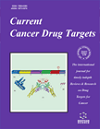-
oa Editorial [Hot Topic: Target Therapy in Brain Tumours and Metastases (Guest Editors: M. Caraglia and R. Addeo)]
- Source: Current Cancer Drug Targets, Volume 12, Issue 3, Mar 2012, p. 185 - 185
-
- 01 Mar 2012
Abstract
Malignant gliomas are the most common type of primary brain tumors and prognosis of patients with these cancers remains poor despite standard treatment with radiotherapy and temozolomide. The structure and functioning of the Blood Brain Barrier (BBB) in brain tumours are controversial and have significant implications for designing new therapeutic strategies. Therefore, it is crucial to develop a strategy to allow drug delivery across the BBB. One way is to use direct delivery strategies with liposomal formulations. Molecular targeted therapy provides new effective treatment options with minimal toxicity; however, the involvement and the interaction of several signalling pathways determine difficulties to detect prevalent targets that can be successfully addressed by novel agents. Therefore, the development of targeted therapy for gliomas has been particularly challenging. Multitargeted kinase inhibitors, novel monoclonal antibodies, and new vaccines have been developed. Standard treatments and current development of new therapies for malignant gliomas are reviewed, focusing specifically on growth factors and their receptors, as well as the downstream intracellular effector molecules. Although histological and molecular genetic variability exists within malignant gliomas, there are alterations in specific cellular signal transduction pathways or cellular functions which are common in most gliomas. This finding has led to trials of novel molecularly targeted therapeutic agents alone, and in various combinations, for patients with malignant gliomas. Brain metastases, which occur in approximately 20-40% of individuals with systemic cancer, represent a significant cause of morbidity and mortality and overwhelm all other types of brain tumors in terms of incidence and public health impact. Recent advances in the treatment of many malignancies have frequently been due to the incorporation of molecular targeted agents into the treatment regimen. The role of target-based agents in the treatment of brain metastases from breast cancer is not still clear even if this tumor disease has largely taken advantage from the wide-spread use of target-based agents such as trastuzumab or lapatinib. We will also discuss the results derived from the trials using EGF-R-targeted agents and anti-VEGF bevacizumab in the treatment of brain metastases from non small cell lung cancer (NSCLC). Given our growing experience with the feasibility and safety of multimodal chemo-radiotherapy in the treatment of brain metastases, as well as the fact that intracranial responses often track extracranial responses in chemotherapy-naive patients, we will also discuss the disease-specific treatment for patients with brain metastases derived from different primary tumor sites. This special issue provides the current understanding of potential new therapeutic targets and keeps in consideration the action and the potential benefits of some promising target-based agents for the treatment of either primary or metastatic brain tumors.


